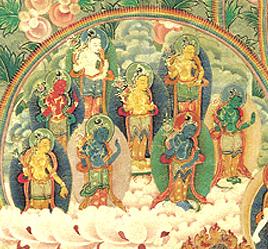Eight great bodhisattvas: Difference between revisions
Jump to navigation
Jump to search
No edit summary |
No edit summary |
||
| Line 10: | Line 10: | ||
*[[Samantabhadra]]. | *[[Samantabhadra]]. | ||
<noinclude> | |||
Each fulfils a particular role to help beings. Symbolically they represent the pure state of the [[eight consciousnesses]]. | Each fulfils a particular role to help beings. Symbolically they represent the pure state of the [[eight consciousnesses]]. | ||
| Line 26: | Line 27: | ||
[[Category:Buddhas and Deities]] | [[Category:Buddhas and Deities]] | ||
[[Category:Hundred Peaceful and Wrathful Deities]] | [[Category:Hundred Peaceful and Wrathful Deities]] | ||
</noinclude> | |||
Revision as of 15:54, 1 January 2009

Eight Great Bodhisattvas, or 'Eight Close Sons' (Wyl. aṣṭa utaputra; Wyl. nye ba'i sras brgyad) — the main bodhisattvas in the retinue of Buddha Shakyamuni:
- Mañjushri,
- Avalokiteshvara,
- Vajrapani,
- Maitreya,
- Kshitigarbha,
- Akashagarbha,
- Sarvanivaranavishkambhin, and
- Samantabhadra.
Each fulfils a particular role to help beings. Symbolically they represent the pure state of the eight consciousnesses.
Qualities of the Eight Bodhisattvas
Although the eight bodhisattvas or ‘close sons of the Buddha’ all possess the same qualities and powers, each one displays perfection in a particular area or activity.
- Manjushri embodies wisdom;
- Avalokiteshvara embodies compassion;
- Vajrapani represents power;
- Kshitigarbha increases the richness and fertility of the land;
- Sarvanivaranavishkambhin purifies wrong-doing and obstructions;
- Maitreya embodies love;
- Samantabhadra displays special expertise in making offerings and prayers of aspiration; and
- Akashagarbha has the perfect ability to purify transgressions.